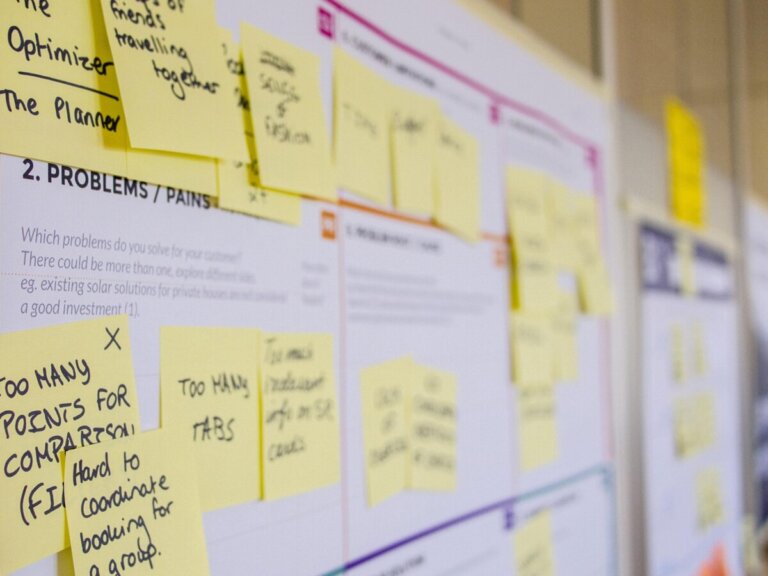
Author: Simone Kohl
· 4 mins read · 1,952 views
Five Essential Soft Skills of Project Management
The task of a project manager is to accompany the project from start to finish. To achieve this goal, several skills and tasks can help. Since hard skills such as risk management, project planning or budgeting are often not enough, as a project manager you also need other interpersonal skills in the form of soft skills.
Here you can learn which soft skills in project management are necessary to become a better project manager.
What Does a Project Manager Do?
A project manager is responsible for various projects. These always have a specific goal, deadline, and employees. The task of the project manager is to coordinate and monitor all aspects. This includes both communications with all people involved in the project, managing the team, meeting deadlines, and prioritizing tasks.
You can read more about what the project manager’s tasks are on our blog post: How to become a project manager.
What are Soft Skills of Project Management?
Soft skills show how they work. These include interpersonal skills, communication, time management, empathy. These are often important in position applications because recruiters look for these skills to increase success in the workplace. After all, even if someone has excellent technical skills, but lacks soft skills like time management. Soft skills are so important because many positions require employees to work with other people. This is because soft skills are also transferable skills that can be used regardless of what the person is doing. This makes employees more adaptable.
Soft skills include the following:
- Adaptability
- Communication
- Work ethic
- Ability to work in a team
- Motivation skills
- Critical thinking
- Conflict resolution
What are Hard Skills?
Hard skills are abilities that can be learned. They are learned primarily at school or in the workplace. These skills are also often cited in position applications and are easy for recruiters to recognize. Hard skills differ depending on the position.
However, for the position of a Project Manager, these can be:
- Conduct negotiations
- Technical skills
- Organization skills
- Goal setting
- Project planning
- Budget management etc.
Can Soft Skills Become Hard Skills?
Soft skills and hard skills are fundamentally different. Soft skills are transferable and interpersonal. They enable good cooperation with other people. So the soft skills can rather not become hard skills, they are best combined.
Why are Soft Skills Important in Project Management?
In project management, it’s not just that a project is completed that counts, but also how. It is about effective interaction and communication. To achieve this goal, the project manager must create a combination of leadership, supervision, communication, and planning. These soft skills help ensure that the entire team can work effectively and complete the project.
Managing a team requires a high level of responsibility and people skills. Therefore, if the soft skills are not present, it can harm the project.
Top 5 Soft Skills of Project Management
- Communication
- An important part of a project is communication. Because without good communication, the success of the project is difficult.
- For the team to work effectively with each other and with other stakeholders, communication must be constant.
- Clear communication helps solve problems and ensures that all team members are constantly up to date. Here, the exchange must go both ways, from the management level and the team members.
- Organization
- A good project manager must be well organized and have everything related to the project in mind.
- The project manager has to take care of many things, such as tasks, processes, cost calculations, and much more.
- To do these things successfully, a certain amount of organization is required. For this, it is important to work in a structured way in individual phases and to have a project plan.
- If the team is often looking for something or having trouble meeting deadlines and submitting documents, this could be an indication that you need to optimize structures.
- Flexibility
- Flexibility is an important foundation for agile working.
- The project manager must be able to react flexibly to the team and the goals. Therefore, it is also his task to create a flexible framework in which the team can work.
- Time Management
- In project management, tasks are mostly dependent on time.
- It is important to manage and use time effectively.
- It is critical to allocate the budget, time, and scope of the project wisely and to allocate your own and the team’s time so that it can be used most effectively.
- To establish clear rules for the team, a specific time for tasks can be set with the team (timeboxing). This way, time can be tracked and difficulties can be identified.
- If team members cannot meet the set time, you as the project manager need to develop strategies to get the team back on track.
- Quality Control
- As a project manager, you have responsibility for the project.
- Quality management is an important part of this.
- Tasks that do not achieve the goal and unnecessarily complicate the project must be identified and discarded.
- For each step, a goal should be set against which the purpose of the task can be measured. Therefore, you need to set a clear vision and communicate it with the team.
- The steps and tasks should be understandable to all team members so that the team can comprehend and follow the tasks.
Personality Attributes of a Project Manager
- Being proactive
- Decisiveness
- Strategic thinking
- Committed to work
- Pursuing vision
How to Develop Those Soft Skills of Project Management
Even though many people have these skills, the project manager needs to apply them to the position. With the help of training and education, these skills can be developed and optimized. Then these skills can be used throughout the project lifecycle.
Looking for Expert IT Solutions?
Subscribe to Our Newsletter for Exclusive Tips and Updates!
Stay ahead of tech challenges with expert insights delivered straight to your inbox. From solving network issues to enhancing cybersecurity and streamlining software integration, our newsletter offers practical advice and the latest IT trends. Sign up today and let us help you make technology work seamlessly for your business!



Share